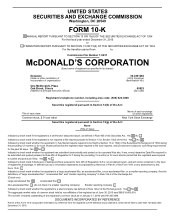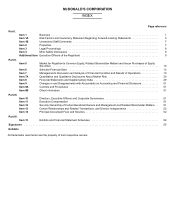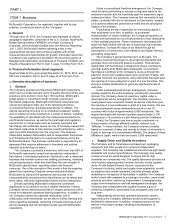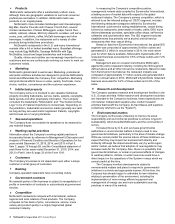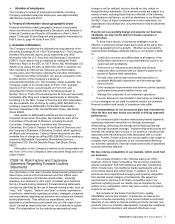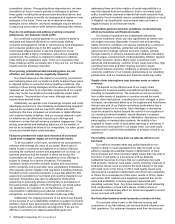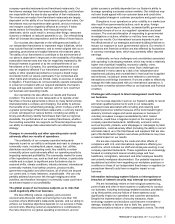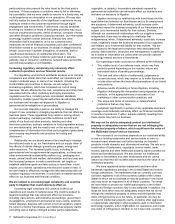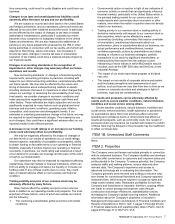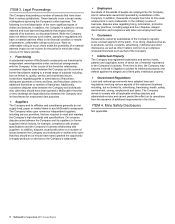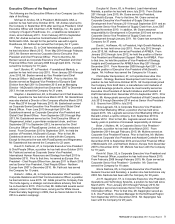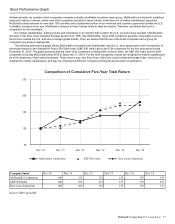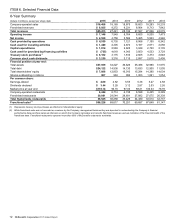McDonalds 2015 Annual Report Download - page 4
Download and view the complete annual report
Please find page 4 of the 2015 McDonalds annual report below. You can navigate through the pages in the report by either clicking on the pages listed below, or by using the keyword search tool below to find specific information within the annual report.
2 McDonald's Corporation 2015 Annual Report
Products
McDonald’s restaurants offer a substantially uniform menu,
although there are geographic variations to suit local consumer
preferences and tastes. In addition, McDonald’s tests new
products on an ongoing basis.
McDonald’s menu includes hamburgers and cheeseburgers,
Big Mac, Quarter Pounder with Cheese, Filet-O-Fish, several
chicken sandwiches, Chicken McNuggets, wraps, french fries,
salads, oatmeal, shakes, McFlurry desserts, sundaes, soft serve
cones, pies, soft drinks, coffee, McCafé beverages and other
beverages. In addition, the restaurants sell a variety of other
products during limited-time promotions.
McDonald’s restaurants in the U.S. and many international
markets offer a full or limited breakfast menu. Breakfast offerings
may include Egg McMuffin, Sausage McMuffin with Egg,
McGriddles, biscuit and bagel sandwiches and hotcakes.
Quality, choice and nutrition are increasingly important to our
customers and we are continuously evolving our menu to meet our
customers' needs.
Marketing
McDonald’s global brand is well known. Marketing, promotional
and public relations activities are designed to promote McDonald’s
brand and differentiate the Company from competitors. Marketing
and promotional efforts focus on value, quality, food taste, menu
choice, nutrition, convenience and the customer experience.
Intellectual property
The Company owns or is licensed to use valuable intellectual
property including trademarks, service marks, patents, copyrights,
trade secrets and other proprietary information. The Company
considers the trademarks “McDonald’s” and “The Golden Arches
Logo” to be of material importance to its business. Depending on
the jurisdiction, trademarks and service marks generally are valid
as long as they are used and/or registered. Patents, copyrights
and licenses are of varying durations.
Seasonal operations
The Company does not consider its operations to be seasonal to
any material degree.
Working capital practices
Information about the Company’s working capital practices is
incorporated herein by reference to Management’s Discussion and
Analysis of Financial Condition and Results of Operations for the
years ended December 31, 2015, 2014, and 2013 in Part II,
Item 7, pages 13 through 28, and the Consolidated statement of
cash flows for the years ended December 31, 2015, 2014, and
2013 in Part II, Item 8, page 33 of this Form 10-K.
Customers
The Company’s business is not dependent upon either a single
customer or small group of customers.
Backlog
Company-operated restaurants have no backlog orders.
Government contracts
No material portion of the business is subject to renegotiation of
profits or termination of contracts or subcontracts at government
election.
Competition
McDonald’s restaurants compete with international, national,
regional and local retailers of food products. The Company
competes on the basis of price, convenience, service, menu
variety and product quality in a highly fragmented global
restaurant industry.
In measuring the Company’s competitive position,
management reviews data compiled by Euromonitor International,
a leading source of market data with respect to the global
restaurant industry. The Company’s primary competition, which is
referred to as the informal eating out ("IEO") segment, includes
the following restaurant categories defined by Euromonitor
International: quick-service eating establishments, casual dining
full-service restaurants, street stalls or kiosks, cafés,100% home
delivery/takeaway providers, specialist coffee shops, self-service
cafeterias and juice/smoothie bars. The IEO segment excludes
establishments that primarily serve alcohol and full-service
restaurants other than casual dining.
Based on data from Euromonitor International, the global IEO
segment was composed of approximately 8 million outlets and
generated $1.2 trillion in annual sales in 2014, the most recent
year for which data is available. McDonald’s Systemwide 2014
restaurant business accounted for 0.5% of those outlets and 7.2%
of the sales.
Management also on occasion benchmarks McDonald’s
against the entire restaurant industry, including the IEO segment
defined above and all other full-service restaurants. Based on data
from Euromonitor International, the restaurant industry was
composed of approximately 17 million outlets and generated $2.4
trillion in annual sales in 2014. McDonald’s Systemwide restaurant
business accounted for 0.2% of those outlets and 3.6% of the
sales.
Research and development
The Company operates research and development facilities in the
U.S., Europe and Asia. While research and development activities
are important to the Company’s business, these expenditures are
not material. Independent suppliers also conduct research
activities that benefit the Company, its franchisees and suppliers
(collectively referred to as the "System").
Environmental matters
The Company continuously endeavors to improve its social
responsibility and environmental practices to achieve long-term
sustainability, which benefits McDonald’s and the communities it
serves.
Increased focus by U.S. and overseas governmental
authorities on environmental matters is likely to lead to new
governmental initiatives, particularly in the area of climate change.
While we cannot predict the precise nature of these initiatives, we
expect that they may impact our business both directly and
indirectly. Although the impact would likely vary by world region
and/or market, we believe that adoption of new regulations may
increase costs for the Company. Also, there is a possibility that
governmental initiatives, or actual or perceived effects of changes
in weather patterns, climate, or water resources could have a
direct impact on the operations of the System in ways which we
cannot predict at this time.
The Company monitors developments related to
environmental matters and plans to respond to governmental
initiatives in a timely and appropriate manner. At this time, the
Company has already begun to undertake its own initiatives
relating to preservation of the environment, including the
implementation of more energy efficient equipment and
management of energy use and more sustainable sourcing
practices in many of its markets.

